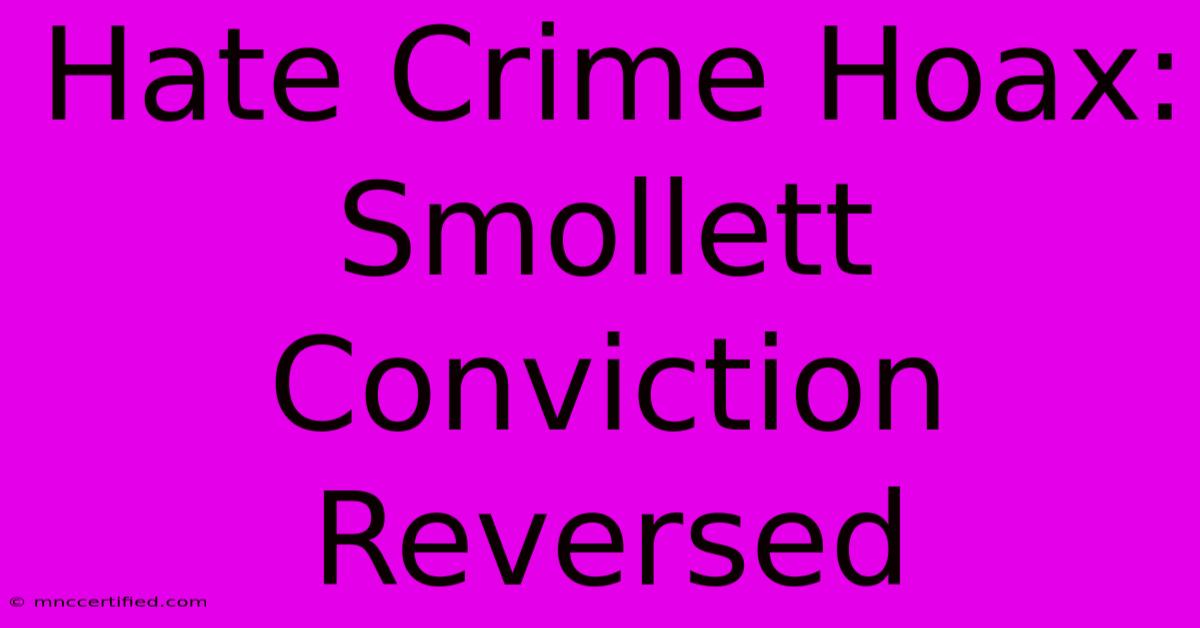Hate Crime Hoax: Smollett Conviction Reversed

Table of Contents
Hate Crime Hoax: Smollett Conviction Reversed – A Deeper Dive into the Case
The case of Jussie Smollett, the actor who orchestrated a highly publicized hate crime hoax, captivated the nation and sparked intense debate about race, media bias, and the justice system. While initially convicted, his conviction was later reversed, raising significant questions about the legal proceedings and their implications. This article delves into the details of the case, examining the initial accusations, the subsequent investigation, the reversal of the conviction, and the lasting impact of this controversial incident.
The Alleged Attack and Initial Investigation
In January 2019, Jussie Smollett, then a star on the television show Empire, reported to Chicago police that he had been the victim of a brutal hate crime. He claimed he was attacked by two masked men who shouted racial and homophobic slurs, poured bleach on him, and placed a noose around his neck. The alleged attack immediately garnered national attention, fueling outrage and igniting conversations about the prevalence of hate crimes in the United States.
The initial investigation by Chicago police appeared to corroborate Smollett's account. However, as the investigation progressed, inconsistencies emerged in his story, leading to increased scrutiny. This initial phase highlights the crucial role of thorough investigation in cases of alleged hate crimes, where public perception and potential for misinformation are significant.
The Turning Point: Shifting Narrative and Evidence
The narrative began to unravel as inconsistencies in Smollett's statements became apparent. Police uncovered evidence that contradicted his version of events. The brothers involved, Olabinjo and Abimbola Osundairo, initially identified as the attackers, ultimately testified against Smollett, claiming he had orchestrated the entire incident. This testimony revealed that Smollett had allegedly paid the brothers to stage the attack, providing crucial evidence that shifted the focus from victim to perpetrator. This pivotal moment illustrates the importance of unbiased investigation in separating truth from fabrication, even when public pressure and media narratives are intense.
The Conviction and Subsequent Reversal
Smollett was subsequently charged with disorderly conduct, a felony. He was found guilty on five of the six counts against him. However, this conviction was later overturned. The appellate court found that the special prosecutor appointed to the case, Dan Webb, was improperly appointed, questioning the legality of the proceedings. This reversal sparked further controversy, raising concerns about procedural fairness and the potential for loopholes in the legal system. The ruling emphasized the critical role of proper legal procedure and its impact on the final outcome of a case.
Analyzing the Reversal: Legal Technicalities versus Substantive Justice
The reversal of Smollett's conviction focuses attention on the intricacies of legal procedure. While many believed Smollett's actions were reprehensible and demonstrated a disregard for the seriousness of hate crimes, the legal technicality concerning the appointment of the special prosecutor resulted in the dismissal of the charges. This situation highlights the tension between achieving substantive justice—holding Smollett accountable for his actions—and upholding strict adherence to legal procedure. The debate continues around whether procedural flaws should outweigh the substantive evidence of guilt.
The Lasting Impact and Implications
The Smollett case continues to resonate within the public consciousness, raising several important questions:
- The impact of false accusations on genuine victims of hate crimes: The case highlights the damage inflicted by false accusations, potentially eroding public trust and undermining the credibility of genuine victims.
- The role of the media in shaping public perception: The initial media coverage largely accepted Smollett's account without sufficient critical examination, underscoring the need for responsible reporting and thorough fact-checking.
- The importance of impartial investigations and due process: The case reinforces the necessity of thorough investigations and the adherence to due process, regardless of public pressure or media narratives.
The Jussie Smollett case remains a complex and controversial chapter in American legal history, offering valuable lessons about the importance of thorough investigation, impartial justice, and the far-reaching consequences of misinformation. The ongoing debate underscores the need for continued dialogue on these issues and a commitment to improving the system to prevent similar incidents from occurring in the future. The reversal of his conviction, while based on a legal technicality, doesn’t erase the gravity of his actions and their wider implications.

Thank you for visiting our website wich cover about Hate Crime Hoax: Smollett Conviction Reversed. We hope the information provided has been useful to you. Feel free to contact us if you have any questions or need further assistance. See you next time and dont miss to bookmark.
Featured Posts
-
John Prescott Passes Away At 86
Nov 22, 2024
-
Volcano Near Grindavik Icelands 7th Eruption
Nov 22, 2024
-
Does Insurance Cover Tmj Surgery
Nov 22, 2024
-
Nfl Tnf Steelers Browns Prediction Line
Nov 22, 2024
-
Captive Insurance Cayman Islands
Nov 22, 2024